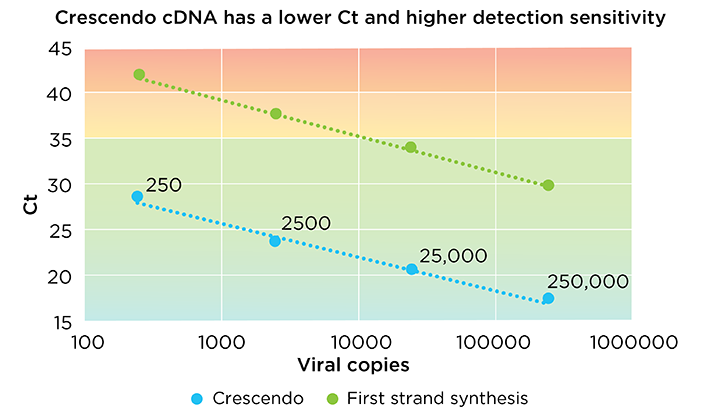The Crescendo cDNA™ Synthesis for qPCR kit provides a simple, robust method for preparing amplified cDNA from any RNA.
Can your current cDNA synthesis kit do all of the following?
- Increased sensitivity - able to detect extreme low copy transcripts (even when other kits draw a blank)?
- Yields enough cDNA for all your studies even with low quality RNA
- Unbiased amplification - preserving the biological information contained in the samples
- Compatible with challenging sample sources - enabling better amplification of your transcripts
Crescendo cDNA synthesis has been designed from the ground up to provide dramatically improved sensitivity over the standard single strand cDNA synthesis method. Utilizing Tecan’s user-friendly SPIA® (Single Primer Isothermal Amplification) technology, Crescendo cDNA synthesis generates more copies of each RNA transcript than standard first strand cDNA synthesis methods making it ideal for the detection of low abundance transcripts.

Crescendo amplified cDNA provides better detection of SARS-CoV-2. A 10-fold dilution series of SARS-CoV-2 RNA, ranging from 250 to 250,000 copies was added to a background of 2.5 ng of K562 total RNA. The RNA was converted to cDNA using a standard first strand synthesis kit or the Crescendo cDNA Synthesis for qPCR kit. The CDC SARS-CoV-2_N2 TaqMan assay showed that SARS-CoV-2 was detected significantly earlier with the Crescendo amplified cDNA compared to the first strand synthesis method which required significantly more PCR cycles at the low input ranges increasing the potential for false negative results.
Was that sample really negative? Or did your current protocol just fail to detect it?
In testing with nasal swabs from COVID-19 patients, Crescendo cDNA synthesis outperformed standard first strand Synthesis techniques across all samples (see below). Compared to standard first strand synthesis, CDC developed TaqMan SARS-CoV-2 probes demonstrated superior detection ability with Crescendo amplified cDNA even with high human RNA background.

With high-quality samples the Crescendo cDNA synthesis protocol consistently returned a result at a much earlier cycle point. On average across all samples tested, the Crescendo-amplified samples were detected by TaqMan 10.8 cycles earlier than samples amplified using standard first strand techniques. Crescendo provided higher quality experimental data with less background than first stand cDNA synthesis.
For low-quality samples (see above), with very low target copy number, Crescendo was still able to return a positive result, while the first strand amplification failed to detect the presence of SARS-CoV-2 at all. In this instance, a researcher using first strand amplification would have recorded a false negative result and missed the presence of the virus.
How much research can you do with one sample?
By converting your starting sample to cDNA, Crescendo cDNA Synthesis for qPCR kit brings several advantages:
- For low copy number, variable or low-quality samples, Crescendo allows you to do far more research using the same set of samples.
- Compared to single strand amplification protocols, Crescendo cDNA synthesis produces more copies from each transcript in your sample, maximizing the amount of material you have to work with.
- Crescendo allows you to do more, with less, creating amplified cDNA library from even low-quality samples, allowing you to perform many more experiments and extract a lot more experimental data from limited or high value samples.
- Produce cDNA to make storage and archiving much easier allowing you to return to your samples at a later date for follow on studies.
What is SPIA?
At the heart of the Crescendo cDNA Synthesis for qPCR kit is Tecan’s proprietary Single Primer Isothermal Amplification (SPIA) technology, a well-established, highly published, and peer-reviewed method for generating cDNA libraries from RNA samples. SPIA is an unbiased amplification technique which preserves biological information from your samples. A rapid, user friendly protocol that is compatible with challenging sample sources enabling better amplification of your transcript of interest.
For Research Use Only. Not for use in diagnostic procedures.